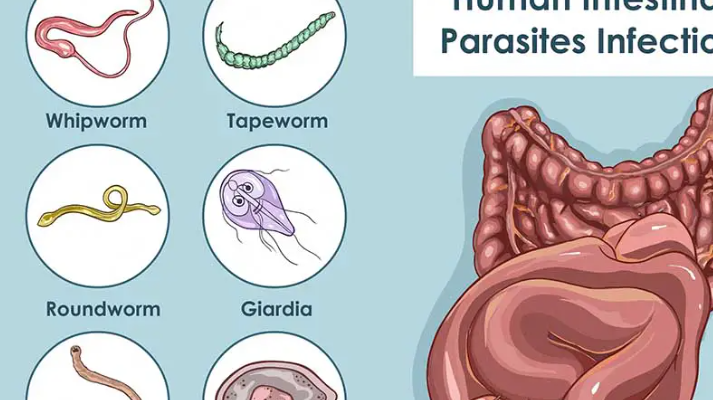Intestinal parasites include worms and single-celled organisms that live in the intestines of a human body. These parasites are transmitted through contaminated foods or water, close contact with a person who’s already infected, as well as because of poor hygiene.
Parasites take advantage of the host’s body for both food and shelter. They rely on the host to transfer to other potential hosts, allowing them to reproduce and spread further.
Having them in your body will cause unpleasant symptoms and in some cases will affect the person’s health and well-being.

The symptoms, however, mainly depend on the type of parasites that have infected the person’s intestines.
Some intestinal parasites may leave you feeling extremely hungry, even after you have just had your meal, while others can cause bloating, diarrhea, and constipation. Other symptoms may include excessive itching and anemia.
However, some of the most common signs and symptoms are as follows:
1. Digestive Issues
Digestive issues, including inflammation in the intestines that leads to vomiting, diarrhea, and constipation accompanied with nausea may be a sign of intestinal parasites.

2. Fatigue
Intestinal parasites feed on the nutrients of the food we consume, leaving us with lack of important nutrients to produce energy, which can easily lead to fatigue.
3. Skin Irritation
The parasites that live inside our body release toxins into the bloodstreams, which leads to skin irritations and itching. They can also be the reason for certain skin conditions such as hives, rashes, rosacea, and even eczema.
4. Anemia
Besides the nutrients we consume, intestinal parasites also feed on red blood cells, causing anemia.
5. Weight Loss
The weight loss may be a side effect of the loss of appetite certain intestine parasites cause at humans.
6. Joint Pain
When they release toxins into the bloodstream, parasites not only affect the person’s skin, but they also cause inflammation of the joints.
7. Allergies
The toxins may also cause allergies that manifest through sneezing, runny nose, and itchy eyes.
The most common way of treating intestinal parasites are over-the-counter medications that treat different types of parasites. In more severe cases, the doctor can prescribe other drugs or the person can even undergo a surgery
To prevent getting parasites practice good hygiene, and avoid contaminated food and water.
*Disclaimer: This information is for informational purposes only and not a substitute for professional medical advice, diagnosis, or treatment. Always consult your physician or healthcare provider with any questions about your health or medications. Do not disregard professional advice based on this information.
Please SHARE this article with your family and friends on Facebook.






